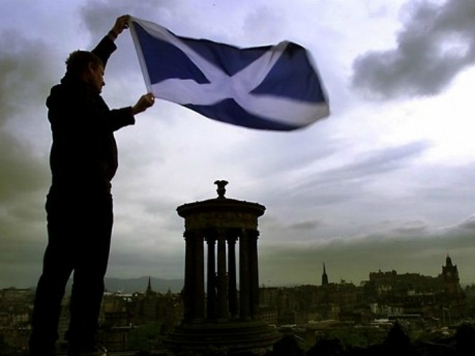With a month to go until Scotland votes on independence from Britain, polls suggest the plan will be defeated, leaving First Minister Alex Salmond and the Yes camp in an uphill battle to secure victory.
Salmond has struggled to convince a majority of Scots on the key question: whether Scotland’s economy, fuelled by North Sea oil and whisky exports, is strong enough to support independence.
Most opinion polls show 45-50 percent support for Scotland remaining part of the United Kingdom with backing for independence ranging from 35 to 39 percent.
But it is thought that up to a quarter of voters could still be undecided or may change their minds before the September 18 ballot.
Shoppers in Glasgow, Scotland’s biggest city which has just hosted the Commonwealth Games, reflected the uncertainty which some feel in the run-up to the vote.
“I think you would need a degree in politics to understand it properly,” said Mark Pentland, a 50-year-old taxi driver who is undecided on which side to support.
“If it goes wrong, then we can’t really go back.”
Looking confident as ever despite the polls, Salmond says his opponents are conducting “Project Fear” trying to put people off voting Yes.
“When you’re putting forward a position of change, the people who want to stop change will want to conjure up all sorts of phantoms and bogeymen,” he told an event in Edinburgh this week.
“It’s like one of those old Hammer Horror movies — when Dracula gets dragged into the sunlight, he disintegrates.”
The leader of the No campaign Alistair Darling hit back in a speech Saturday, saying predictions of an emotion-driven “Salmond surge” remain unfulfilled.
“All the carefully planned milestones which were supposed to generate a tide of emotional support for breaking up Britain have come and gone,” he said.
“The Scottish nation knows that this is far too big a decision to be decided by emotional spasms.”
Salmond has faced persistent questions over whether Scotland could continue to use the pound sterling if it went independent, an issue which looks set to dominate the final month of debate.
The Scottish National Party (SNP) leader insists it could, despite the government in London and other main political parties ruling out a currency union.
The issue dominated coverage of the first television debate between Scotland’s first minister and Darling, who was formerly Britain’s finance minister during the 2008 global financial crisis.
The question of what currency Scots would have in their pockets after a Yes vote would have to be settled during negotiations between the Scottish government and London, which could last some 18 months.
But the current uncertainty is damaging the pro-independence campaign, commentators say.
“The SNP’s position on currency union… has for ages been the weak flank of their entire proposition,” Gerry Hassan, an academic and expert on Scottish politics, wrote in the Scottish Review this week.
Blair McDougall, campaign director for the pro-union Better Together camp led by Darling, said the economy and the currency would continue to dominate their campaigning in the last month.
“We think it’s an economic battle,” he said.
“We think that Alex Salmond has basically failed to do a lot of the fundamental homework he should have done before this sort of stage of the campaign.”
Both the Yes and No camps have a strong bedrock of support, many of whom made up their minds years ago on whether Scotland should be independent.
Mary Dickie, a 69-year-old retired teacher in Glasgow, said she would vote against independence.
She added that she was fed up with “‘Braveheart’, all that carry on” from the pro-independence camp, referring to the 1995 Mel Gibson film often associated with Scottish nationalism.
“If it works, don’t break it. I’m ashamed to say my view is coloured by Alex Salmond, I don’t like him at all,” she added.
Gerald McKenna said he was voting Yes because he wanted to see Scottish taxpayers’ money spent “on hospitals and schools rather than being squandered by bankers and corrupt politicians”.
“England has never, ever given Scotland anything without us fighting for it,” said the 62-year-old retired engineer.
Salmond and Darling have another big chance to persuade undecided voters and consolidate their existing support in the campaign’s second televised debate on August 25.

COMMENTS
Please let us know if you're having issues with commenting.